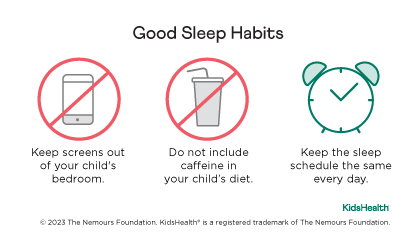Fatigue is extreme tiredness. Most people feel fatigued sometimes and usually there's no serious cause. Making sure your child gets enough sleep and changing some everyday activities usually can help fatigue (feh-TEEG) get better.

Follow your health care provider's instructions for:
- changing or stopping any medicines that may cause fatigue or stress
- getting any tests
- following up
Make sure your child gets enough sleep:
- School-age kids need about 9–12 hours of sleep and teens need about 8–10 hours.
- Set regular sleep and wake times.
- Keep all screens out of the bedroom.
- Help your child avoid caffeine (found in soda, tea, coffee, energy drinks, and chocolate), especially in the afternoon and evening.
Offer your child a healthy diet:
- Include plenty of vegetables and fruits; protein from lean meats, fish, eggs, beans, or nuts; and low-fat dairy products.
- Help them avoid processed foods like chips, candy, cakes, most fried and fast foods, and sugary drinks.
- Be sure your child drinks enough liquids. If they get a lot of physical activity (for example, intense training for a sport), especially outside in hot weather, they may need to replace electrolytes with an electrolyte drink. Talk to your health care provider if you're not sure whether your child needs electrolytes.
Help your child manage stress:
- Talk with them about what can help manage stress. They may find it helpful to try yoga or meditation. Or they may find it helps to take time every day to do something relaxing like listening to music or reading.
- Consider taking some activities off the schedule if your child is too busy.
- Consider having your child talk to a counselor to help them manage stress.
Help your child be physically active every day:
- Walking and biking are great ways to be active.
- If your child is interested in organized sports, help them sign up at school or a local community center.
- If you think your child is getting so much activity that it's causing the fatigue (such as daily training for a sport, especially in hot weather), they may need to cut back on activities.

Your child:
- still has fatigue after following care instructions for 2 weeks
- is too tired to go to work, school, or other activities
- gets new symptoms such as a fever, belly pain, headache, blurry vision, constipation, or weakness
- loses or gains a lot of weight
- seems very sad or irritable; talks a lot about death and dying; or doesn't want to eat, hang out with friends or family, or do activities that they used to enjoy
You know your child best. Call your health care provider if you see any signs that worry you.

Your child talks about, plans, or tries to harm themself or anyone else.
If you feel that your child may be thinking about or planning to kill themselves, you or your child can call or text 988 to reach the Suicide and Crisis Lifeline or get help on their website: 988lifeline.org.

What causes fatigue? In kids and teens, it's usually caused by:
- not getting enough sleep
- getting too much or too little physical activity
- not eating a nutritious diet
- stress
- some kinds of medicines
- grief after a loss of a loved one
- depression or anxiety
Less often, it is caused by a medical problem.




